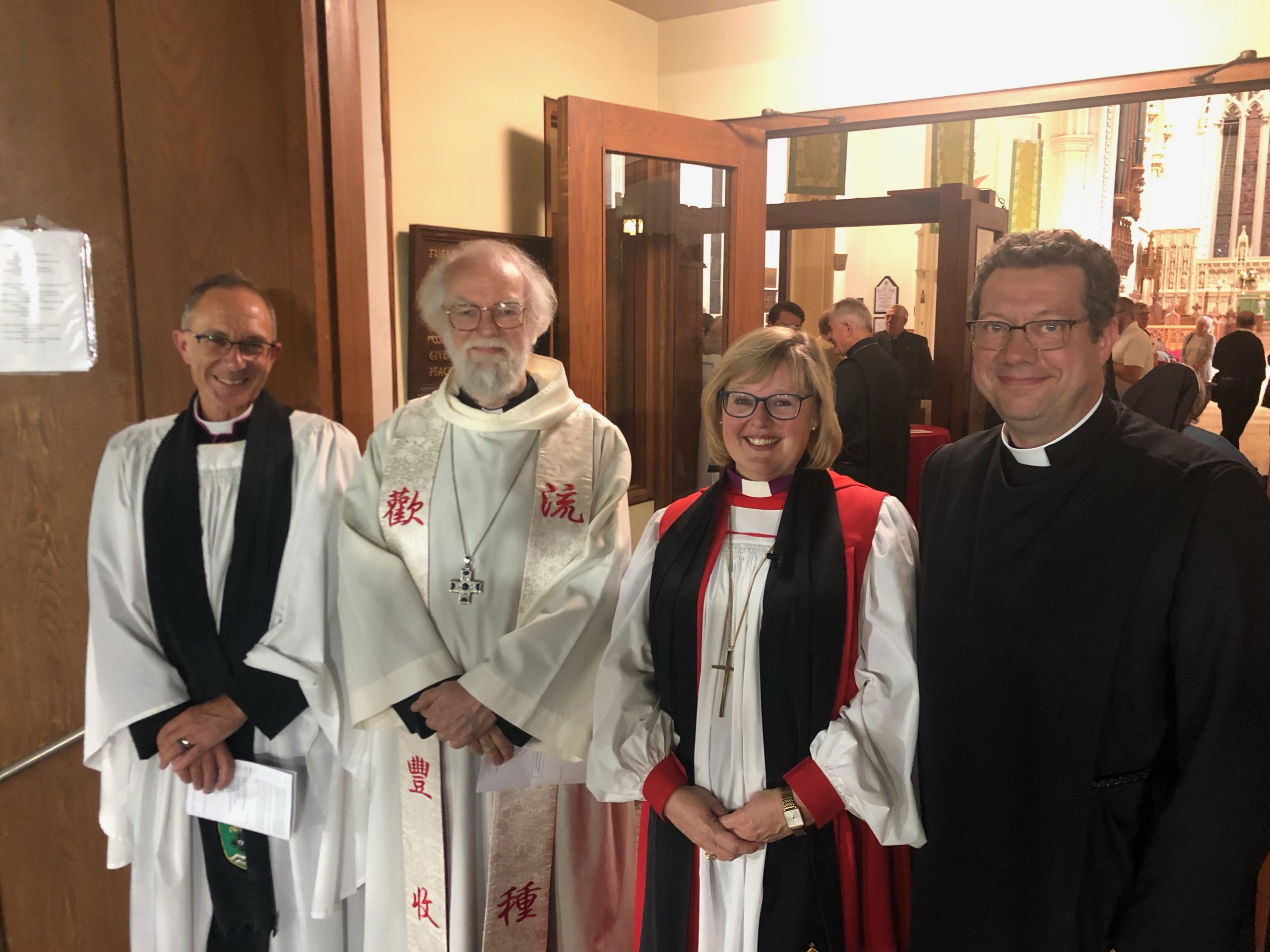The Diocese of Niagara hosted the Right Reverend and Right Honourable Rowan Williams, Baron Williams of Oystermouth, along with the Oratory of the Good Shepherd, at Christ’s Church Cathedral for a Choral Evensong Service. Archbishop Williams preached about The Queen’s witness, The Oratory of the Good Shepherd, and on unity and wholeness, among other things.
Speaking on Ezekial 37:1-14, Archbishop Williams shared, “In Ezekiel’s vision, surrounding all these bits and pieces that lie fractured in the desert, surrounding all this, are the four winds to which the prophet addresses his summons: ‘Come from the four winds, O breath, breathe life, into these bones.’” These four winds of the Spirit of God, suggested Archbishop Williams, are everywhere we look, blowing us together into “a connection we couldn’t have imagined for ourselves, or achieved for ourselves.”
The 104th Archbishop of Canterbury called for lives of peace-filled witness, stating, “Peace-filled lives are not a fantasy.” Archbishop Williams urged listeners to “stake today, tomorrow, and the day after” on “the God who surrounds us.” This God, urged Archbishop Williams, brings us together, holds us together, and makes us both at one with ourselves and with each other “in all kinds of ways we couldn’t devise and couldn’t imagine.”
Archbishop Williams spoke shortly after the death of Her Majesty Queen Elizabeth II, and as such, was on the minds of everyone in attendance, including Archbishop Williams. Speaking on the life and legacy of The Queen, Archbishop Williams reflected on an oft-quoted phrase of her late Majesty: “I have to be seen to be believed.” She was visible, argued Archbishop Williams, at great world events. “She was there and she needed to be visibly there.” So too in the Church, suggested Archbishop Williams, must people be visibly seen. “In the Church, we do need a few people who are visibly there. Visibly living out that confidence that the promise of God will hold us together.” No matter how fragmented, unsuccessful, or plain our lives might look, Archbishop Williams reminded the audience that to believe in God’s purpose, and God’s promise, “we need to see it, and for us to see it, we need to see it in certain styles of life.”
The Archbishop reminded the audience that the wholeness of life, “the wholeness of the life of the Church,” depends on God, and not on our success or ingenuity. What if, suggested Archbishop Williams, “it depends on God? What if it depends on what blows from the four winds, to bring us together, to make us at peace with ourselves, and at peace with one another? That’s the promise!”
Archbishop Williams is the current Ecclesiastical visitor of the Oratory of the Good Shepherd, who were at the Monastery of Mount Carmel in Niagara Falls for their triennial General Chapter meeting. “The radical offering that religious community makes, ‘that I’m just going to be held together by the Spirit of God,’” said Archbishop Williams, “Is a word and a sign for the rest of us.”
The Oratory of the Good Shepherd is an Anglican Religious Community of brothers founded in 1913 in Cambridge. The community, which is made up of lay and ordained members, has provinces in Canada and the United States, as well as Australia, South Africa, and across Europe.
The Oratory of the Good Shepherd is a dispersed community bound by a common Rule of life and discipline. As a dispersed community, they are grouped into “colleges” and meet regularly for prayer and support, and worship, as well as retreats as Provinces and the whole Oratory. The spirit of the oratory is expressed in its “Seven Notes”, which call the brethren to fellowship, stewardship of gifts and possessions, love, labour of the mind, and to a life of joy and thanksgiving.

Resurrection of Hope in Thundering Waters